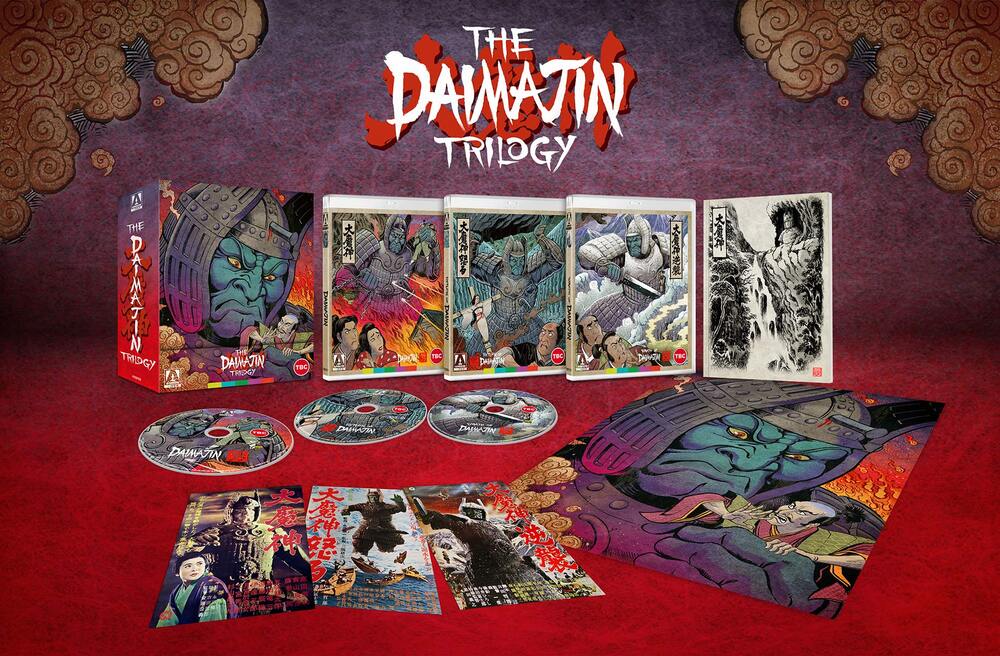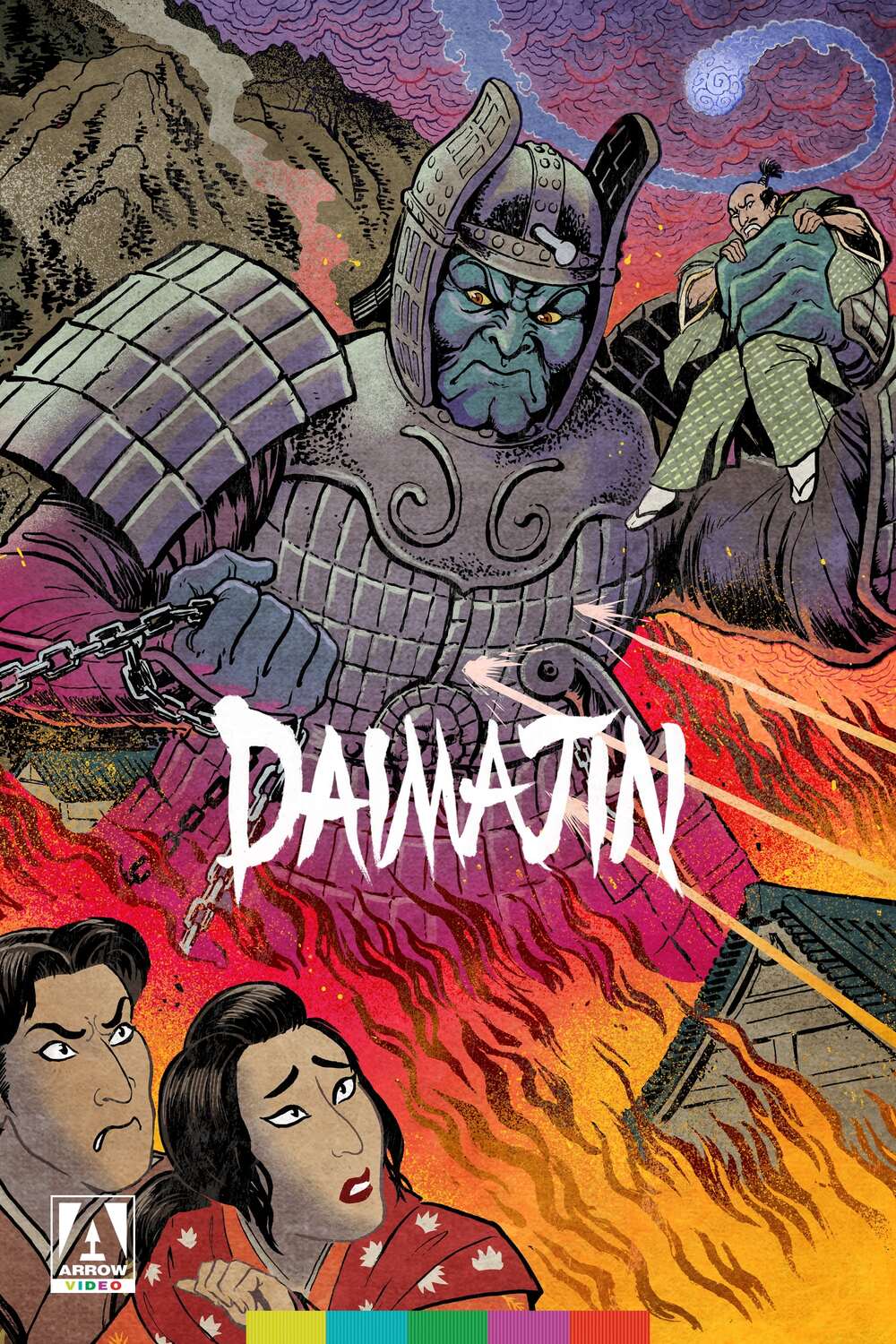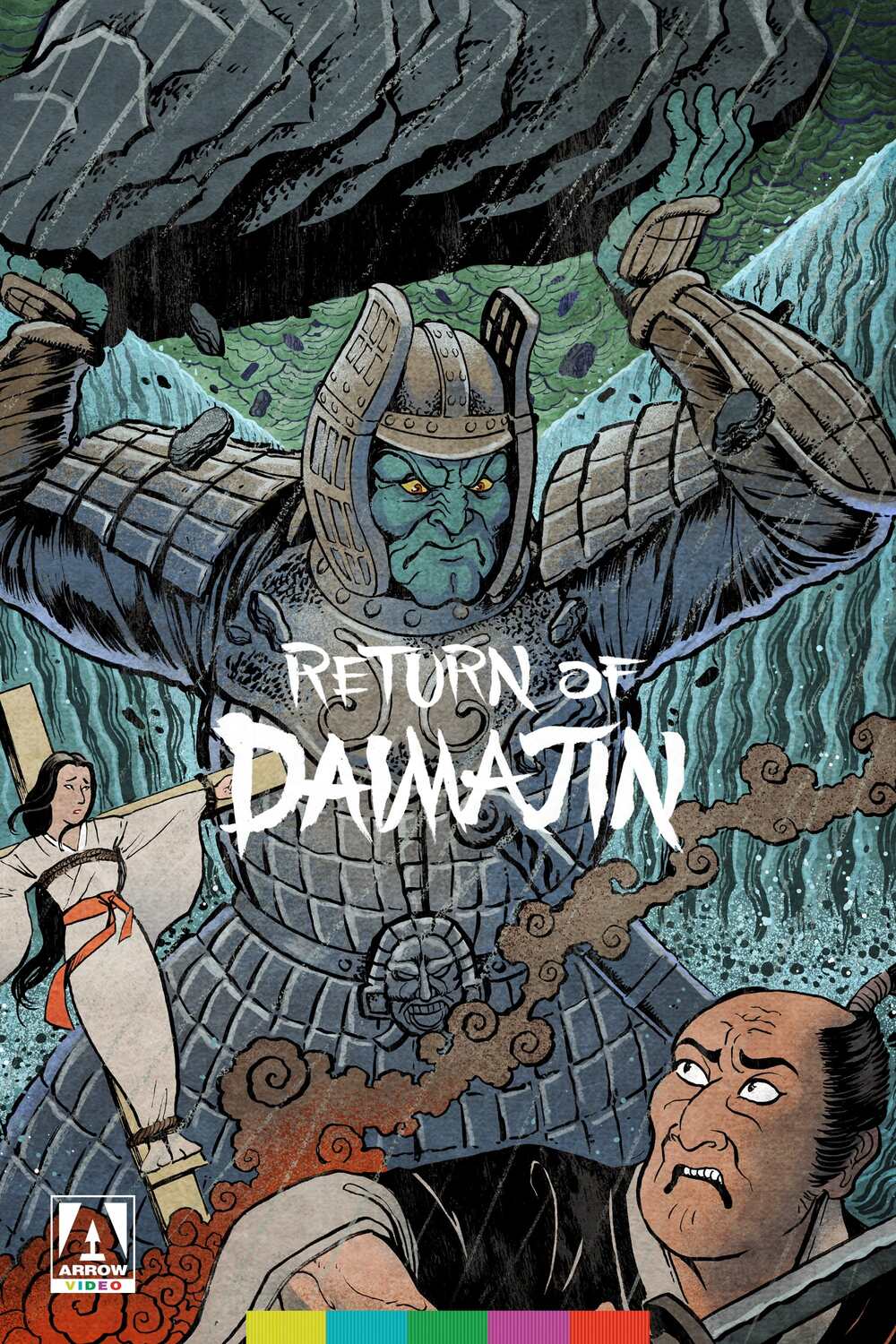-
The Daimajin Trilogy Boxed Set by Arrow Films

Daimajin (1966) - Excellent Mixture of Period Drama and Giant Monster Movie - 8/10

Daimajin is a creative mixture of a jidaigeki and a kaiju. The former describes a period drama in the style of samurai movies such as the excellent Zatoichi film series. The latter describes films with giant monsters such as the Gamera film series. Daiei Film attempted to combine both genres and managed to create, promote and release three extraordinary films in the same year that deserve more attention, recognition and respect.
Daimajin is the first entry. It tells the story of a chamberlain who is planning a violent coup d'état. He attempts to murder his lord's entire family but the son and daughter are saved by a courageous samurai. The samurai gets additional help from his aunt who is a priestess of Daimajin. The children grow up in hiding in several caves under the statue of Daimajin. As the chamberlain has established a pitiless tyranny, the oldest son plans to take back what should belong to him. When his plan fails tragically and the chamberlain's men are about to destroy the statue of Daimajin, the demon god comes to life and punishes the wrongdoers.
This movie convinces on many levels. First of all, it has excellent flow, pace and structure in its concise running time of eighty-four minutes and doesn't ever get boring for one single second.
Up next, the film's characters are particularly intriguing. The protagonists are courageous, loyal and perseverant which makes viewers empathize strongly with them. The antagonists on the other side are brutal, immoral and selfish which makes viewers despise them. The movie also includes several memorable side characters with strong emotional motives whose actions are interesting to follow.
The movie's special effects are surprisingly great, especially if compared to the Gamera film series that hasn't aged particularly well. The titular monster looks scary, the historic settings have been constructed with great care and the final fifteen minutes are filled with spectacular actions and events.
As you can read, Daimajin is a movie that should equally please jidaigeki and kaiju fans. This movie has the depth and details of the former and the energy and imagination of the latter. This film has aged surprisingly well and its morals still apply today. Daimajin makes for a wonderful movie for the entire family as children, teenagers and adults should be similarly delighted. Make sure to purchase the wonderful boxed set by Arrow Films that includes all three movie, plenty of bonus material, a detailed book about the film series and a wonderfully colourful cover that should make anyone who doesn't own this gem particularly jealous.
Daimajin Ikaru / Return of Daimajin (1966) - A Great Example of How to Make a Timeless Movie with a Limited Budget but Much Professionalism - 9/10

Return of Daimajin is the second film in the trilogy about the great demon god that combines elements of period dramas and giant monster movies. In this shortest movie of the series, an evil lord menaces, destroys and conquers two neighbouring villages when farmers seek refuge from him in these peaceful places. The survivors of the invasion retreat to an island on a lake where Daimajin's statue is hidden in a cave. As the lord destroys the statue, the demon god comes to life to save the villagers from the murderous dictator.
This movie convinces on numerous levels and has aged very well. First and foremost, this film clocks in at only seventy-nine minutes and entertains from start to finish with swift pace.
Up next, the locations have been chosen particularly well and bring ancestral Japan back to life. The scenic mountains and fields, the colourful villages and fortifications as well as the mysterious island on the lake are quite memorable.
The characters are also very intriguing. The antagonist is particularly brutal, pitiless and selfish and will make viewers root against him. The protagonists shine with courage, perseverance and resilience and will make viewers empathize with them. Even the side characters have interesting emotional characteristics to offer. Needless to say that the skilled acting performances match the wonderful script.
The final twenty minutes of the movie are particularly spectacular. The titular monster goes on an impressive rampage as the simple yet efficient special effects shine brightly in this movie. The architecture of the villages, the armour of the monster and the costumes of the villagers have all been crafted with great detail. The destruction of infrastructures looks impressive and has been prepared very skillfully and filmed very precisely.
The technical aspects of this movie are very strong in general. Even decades later, the calm, organized and precise camera work stands out very positively if compared to numerous action movies with dizzying shaky camera sections. The authentic, detailed and intense sound effects in the destructive finale will send shivers down the spine of any cineast. The excellent classical music soundtrack by skilled veteran Ifukube Akira is another noteworthy highlight and makes an intense movie even more emotional.
As you can read, Return of Daimajin is even a slight improvement over its critically acclaimed genre-breaking predecessor Daimajin. This sophomore entry is even more detailed, organized and precise as it turns out being a great example of how to make a timeless movie with a limited budget but much professionalism. The two movies aren't directly related to each other, so you could watch Return of Daimajin as a standalone feature. Anyone who likes period dramas and monster movies should call a copy of this movie her, his or their own. I would suggest picking up the wonderful boxed set by Arrow Media with all three films and plenty of interesting bonus material.
Daimajin Gyakushû / Wrath of Daimajin (1966) - Adventurous Conclusion to an Underrated Franchise - 9/10

Wrath of Daimajin is the third, final and best entry in the Japanese franchise about the ancient demon god who protects his disciples from cruel injustices. In this movie, a group of lumbermen have been kidnapped by the henchmen of an evil lord who is trying to build powerful weapons to invade neighbouring communities. One lumberman survived severely injured and made it back to his village. While the adults in the village are too scared to try to save their fellow citizens, four young boys decide to leave secretly to save their kidnapped fathers. However, they don't only have to confront the evil lord's pitiless army but numerous natural obstacles such as dangerous earthquakes, wild rivers and heavy snowfall. The four boys have to go onto Daimajin's sacred mountain to make it to the evil lord's labour camp and the mysterious deity decides once more to intervene.
This third movie has a completely different vibe than the previous entries. First of all, the protagonists of this movie are four courageous children. Daiei Film attempted to aim for a younger target audience with this movie and the company did a surprisingly convincing job. In addition to this, Wrath of Daimajin can certainly be described as an adventure movie as it follows the children's epic journey across the mountains. Another element that might come as a surprise is that this movie might also be the most brutal one in the franchise. If you thought that this movie might be less intense because children are involved, you are gravely mistaken. These little doses of stunning intensity make this film also the most captivating, emotional and profound one in the franchise.
The movie also convinces in the departments that made the previous entries so enjoyable. The locations are absolutely stunning and vary from traditional mountain villages over dense forests, beautiful meadows and sinister screes to desolate labour camps. The balance between beauty and terror in these locations leads to an emotional rollercoaster ride.
The special effects are once again stunning for their time. The way the filmmakers created artificial snow looks particularly realistic. The scenes on an improvised raft on a dangerous river are particularly memorable. The closing twenty minutes show the titular monster in a most diversified way as a mystical saviour and a fair avenger.
The acting performances also deserve critical acclaim. The four child actors are everything but shallow and play their roles with focused dedication and emotional depth. The adults also do wonderful jobs as the fearful peasants evoke strong controversial feelings among viewers while the antagonist is particularly brutal and is even shown torturing one of his prisoners to death.
In conclusion, Wrath of Daimajin is the best entry in the trilogy about the ancient demon god. This movie mixes genre elements of adventure, drama and fantasy in an equally entertaining and profound way. This film should be enjoyed by cineasts of any age and its quality has stood the test of time. It's regrettable that this is the last entry in the franchise since the quality of this trilogy is better than more renowned film series such as Gamera and even Zatoichi. Make sure to purchase the wonderful boxed set by Arrow Films since its elevated price is justified by enjoyable multiple viewings of these three masterpieces.
« Daimajin Gyakushû / Wrath of Daimajin (1966) - Adventurous Conclusion to an Underrated Franchise - 9/10 (13/10/22)Soldiering on with Much Atmosphere, Creativity and Energy - A Review of Megadeth's The Sick, the Dying... and the Dead! »









